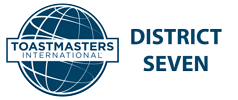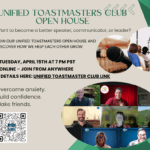Meeting Optimization Support Team (MOST) Toastmasters Plan
When a guest attends a Toastmasters meeting at a Club with few active members, Toastmasters and the club risk losing a prospective new Toastmaster forever. A guest may assume that the first Club they visit is typical. We want guests to have a successful experience at any Toastmasters club they visit.
Clubs will often encourage prospects to visit by having an Open House or Guest Night. An Open House is a great way to bring in guests and have an event that attracts new members. We shake hands, share food, and converse 1:1 with guests to make them feel welcome. Clubs may host a special event such a workshop on interviewing skills, a tall tales contest, an evaluation training session, etc. Special events can be an effective way to introduce new guests to Toastmasters training.
A virtual Open House is more difficult because physical interactions are not possible in a virtual club meeting. Toastmasters need to take fullest advantage of what is possible online – anyone can attend virtually, irrespective of time or distance. This is our biggest asset when it comes to a virtual open house or special event.
The Challenge
Two major factors make it difficult for a small club to rebuild, even after a successful Open House event.
- The work tends to still fall on a small number of individuals in the club. This can quickly lead to burnout and disillusionment for those members who are repeatedly taking on multiple meeting roles. Such feelings of burnout and disillusionment may be reflected in the meetings and felt by guests, impacting their interest in joining the club.
- A guest may attend a successful, dynamic, active Open House or Special Event with many participants, but then return the next week to find only a small number of members. The positive atmosphere from the successful event can quickly dissipate upon discovering a very small on-going group.
Proposal – Strengthen an Open House with an Open Month and a Meeting Optimization Support Team (MOST)
A small Club needs the consistency of an entire month of stable programming to convert guests to members. The idea is to have a team of people from one or more Clubs “adopt” a smaller or at-risk Club. This team provides an infusion of informed guests who pre-fill available roles of speakers, evaluators, table topic speakers – anything needed to ensure that no small Club member must perform more than one role. Thus, guests who return after an Open House event continue to observe Toastmasters as it is meant to be experienced.
Pre-work
The small Club must undertake certain steps to define its value proposition and brand. What makes it special? Why would prospective members join? Who can they invite? The small Club works through its Area Director to request sponsorship.
To qualify for support the club must do the following (the club may work with their Area Director or Club Coach(s) to complete these requirements):
- Have 8 paid members.
- Have four or more club officers trained.
- Complete either a Moments of Truth module or the Club Success Plan for the current year.
- Review the results at an Officer’s meeting with the Area Director.
- Have an updated website with complete meeting information and an accurate listing on “Find Your Club” at Toastmasters.org.
- Schedule an Open House or Special Event at least 30 days in advance.
- Have an online agenda schedule resource such as Easy Speak or FreeToastHost to make meeting planning possible for a distributed team.
- Have the Area Director’s confirmation for the club to participate.
MOST Volunteers
District 7 will help identify volunteers willing to adopt a club. They should be individuals who are Toastmasters in good standing and willing to attend a month’s worth of meetings to provide some consistency to a Club. Volunteers should identify days and time ranges they could typically be available. (IE Monday evening and Sunday morning). Volunteers must acknowledge that their participation is intended to help the club hold effective meetings by filling roles assigned by the club, and not to either try to influence the operations of the club or to recruit prospects for their own club.
- To volunteer to be a part of the MOST, send an email to most@d7toastmasters.org
MOST Program Flow
Once all requirements have been met and the open house/event has been scheduled, the following steps will provide support.
- The club develops publicity for the event.
- The District provides an advertising boost for the event.
- The support team commits a group of Toastmasters who will participate in the club for at least 5 meetings (the event plus 4 following meetings).
- Small Club adds volunteers to their agenda management (for example Easy Speak or FreeToastHost) to prefill roles.
- Support team members fill roles for meetings 1, 2, 3, 4, and 5. Meeting 1 is the Open House or event.
- Small club members work with Club Coach or Area Director on Open House invites.
- Small club members plan a concentrated guest nurture campaign during weeks 1-5.
- Small club members should plan agendas for weeks 6+ to the best of their ability.
- Meeting 1 occurs; nurture campaign begins.
- Meeting 5 occurs and small Club reports results to Club Coach (if any) and Area Director.
Key Factors
When guests attend a meeting, there are three key factors that can determine whether or not that guest will return.
- Welcoming – If the guest feels they were welcomed and included in the meeting, especially if the guest feels their presence would be missed, they are more likely to return.
- Learning – If the guest learned something at the meeting, they are more likely to see value in returning.
- Having Fun – If the guest had fun at the meeting and can look back at it with some laughter, they are more likely to want to return.
Value Proposition of the MOST Program
- Value Proposition 1: Focus on Guests – The Small Club members can focus on attracting and connecting with guests and less on the details of hosting a successful meeting.
- Value Proposition 2: Memorable Speeches – The MOST volunteers can provide talented speakers with compelling speeches that entertain and engage guests. A good story helps guests to feel engaged and relaxed.
- Value Proposition 3: Strong Evaluations – Neurological research tells us that a happy ending to a story triggers the limbic system, our brain’s reward center, to release dopamine which makes us feel more hopeful and optimistic. A good evaluation is the ending to a speech.
- Value Proposition 4: Organized and Positive – Having all the roles filled ahead of time – for a full month – allows the meetings to start and end on time. Meetings that run well reflect well on Toastmasters. They illustrate to guests that their future vulnerability and faith in the organization are well founded.
- Value Proposition 5: Better Toastmasters – All involved Clubs benefit by doing, sharing, practicing. The community is stronger. Guests are more likely to encounter a thriving Club and join. We can increase the number of Distinguished Eligible Clubs in D7 with a targeted campaign.

